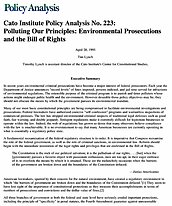Many of our most basic constitutional principles are being compromised to facilitate environmental investigations and prosecutions. Federal lawmakers have authorized coercive “self-confession” programs and warrantless inspections of commercial premises. The law has stripped environmental criminal suspects of traditional legal defenses such as good faith, fair warning, and double jeopardy. Stringent regulations make it extremely difficult for legitimate businesses to operate within the law. Indeed, the web of regulations has grown so dense that many observers believe compliance with the law is unachievable. It is no overstatement to say that many American businesses are currently operating in what is essentially a regulatory police state.
A fundamental reexamination of the federal regulatory structure is in order. It is imperative that Congress reexamine the role of the federal government, as well as the role of criminal sanctions, in environmental law. Reform should begin with the immediate restoration of the legal rights and privileges that are enshrined in the Bill of Rights.


